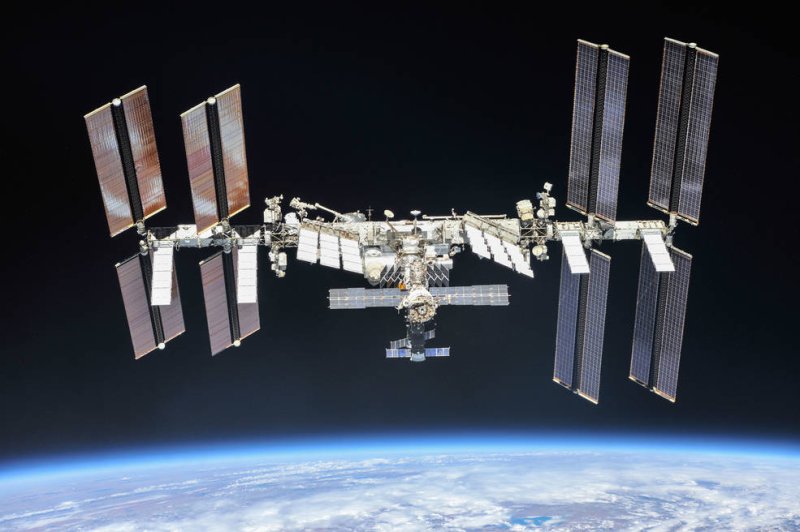
Experts say that Russian aggression against Ukraine could strain the relationship between the United States, Russia and other international partners in the International Space Station, pictured in 2018. Photo courtesy of NASA
ORLANDO, Fla., Feb. 23 (UPI) -- The crisis over Russia's Ukrainian aggression presents NASA and other space agencies with the most serious diplomatic strain in the 22-year history of the International Space Station partnership, experts said.
Russia is a major partner with the United States, Europe, Japan and Canada in the space station's maintenance and operation.
Russia provides critical cargo and crew transport, along with engines that fire periodically to keep the station aloft. Cosmonauts and astronauts often work side-by-side in the orbiting laboratory.
NASA safety advisers are "watching closely" as the crisis deepens, Patricia Sanders, chairwoman of the space agency's independent Aerospace Safety Advisory Panel, told UPI in an email.
"We already have concerns for safety of ISS and for U.S./NASA personnel in Russia with the space program," Sanders said.
The partnership is unlikely to dissolve immediately, but NASA may be prompted to accelerate plans to build commercial space stations if the Ukraine crisis deepens, Jeff Manber, a president with Denver-based Voyager Space, told UPI.
Manber formerly worked in Russia for a key spacecraft company there, RKK Energia.
"Clearly, the charmed life of the ISS is facing its biggest challenge yet," Manber said, referring to Russian President Vladimir Putin's announcement Monday that he would send troops into Eastern Ukrainian separatist regions.
"There is a very high probability that there will be fallout for the ISS partners on the International Space Station, but it won't be today," Manber said. "My feeling is the critical juncture will be 2024, in terms of whether Russia remains a partner and whether we wish them to remain a partner."
NASA recently decided to extend the lifespan of the 22-year-old ISS to 2030 from 2028, partly to allow more time for private companies to develop replacements for the space station.
The facility remains in good condition, but NASA will retire it due to heightened risk as it ages.
The conduct and tone struck by Russia's space agency, Roscosmos, and its director general, Dmitry Rogozin, will be key to the survival of the partnership, Manber said.
"If Rogozin behaves as a space agency head, then the partnership will weather this crisis. If he behaves as a proud and loyal supporter of incursion into Ukraine, it ... could imperil the partnership," he said.
Among other things, Putin said Monday that "Ukraine never had a tradition of genuine statehood," and described threats to Russia that will prompt "retaliatory measures."
After Putin's speech, Rogozin posted on Twitter, "Glory to Russia!" according to a translation.
Manber said that statement alerted him to the potential for greater problems down the road for the space station partnership.
"The greatest supporter for working with Russia has always been the Europeans. They're the ones who asked America to cooperate with Russia more. And yet here, this Ukraine situation is a gut punch to the Europeans," Manber said.
The ISS partnership with Russia previously weathered Russia's annexation of the Crimean Peninsula, formerly part of Ukraine in 2014, Todd Harrison, a director with the Washington-based Center for Strategic and International Studies, said in an interview.
"In the past, our cooperation on space programs with Russia has not been affected by our geopolitics on the ground," Harrison said. "But things change and, you know, it could be different this time around, although I don't think it will be."
Russia and the United States have invested billions in the space station, and neither nation can operate it easily without the other, he said. The facility is also a major point of pride for the Russian space program, he said.
"Plus, the loss of the ISS would affect a lot of others besides just the United States. It affects all of our other partners," Harrison said.
The United States has one advantage it didn't have in 2014, however: SpaceX Dragon capsules carrying astronauts, four at a time, to the station. But Harrison said NASA would be hard-pressed to adapt a U.S. craft to replace Russian vehicles that help to keep the ISS in orbit.
"I don't think that this could lead us to abandon the station and move to commercial substantially sooner than already planned," Harrison said.
No comments:
Post a Comment